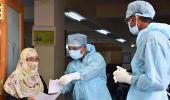The practice of nasal rinsing and gargling with saline water has the potential of helping people fight against COVID-19, according to a report.

The report in international health journal 'Lung India' published on Tuesday points out the significance of nasal rinsing and gargling with saline water in preventing the contract of the virus in the present scenario when the world is reeling under the COVID-19 pandemic.
The report, based on a systematic analysis of articles on nasal rinsing and gargling, says that hypertonic saline (three tea spoons in half litre of water) has the potential of preventing the contract of COVID-19.
"This practice may have the potential of add-on therapy in prevention of diseases like COVID-19," Dr Sheetu Singh, one of the authors and a chest specialist at SMS Medical college, Jaipur told reporters.
She said gargling and nasal rinsing may prevent viral diseases entering through nose and throat.
"Like hand wash, nose and throat wash may also remove or reduce viral load," she said.
Noted pulmonologist Dr Virendra Singh, who co-authored the report, said the practice can saves lives.
"The current emphasis is on preventive strategies such as social distancing, wearing mask, and hand washing. The technique of nasopharyngeal wash to prevent the virus from inhabiting and replicating in the nasal and pharyngeal mucosa has been suggested to be useful in reducing symptoms, transmission, and viral shedding in cases of viral acute respiratory tract infections," the report said.
It said that hypertonic saline gargles and nasal rinse may also be useful in prevention and care of COVID-19 patients.
"The present evidence emphasises the need of randomised controlled trials to evaluate the role and mechanism of nasopharyngeal wash in COVID-19," it said.
Other co-authors of the report are experts from Indian Institute of Health Management Research, Jaipur.










